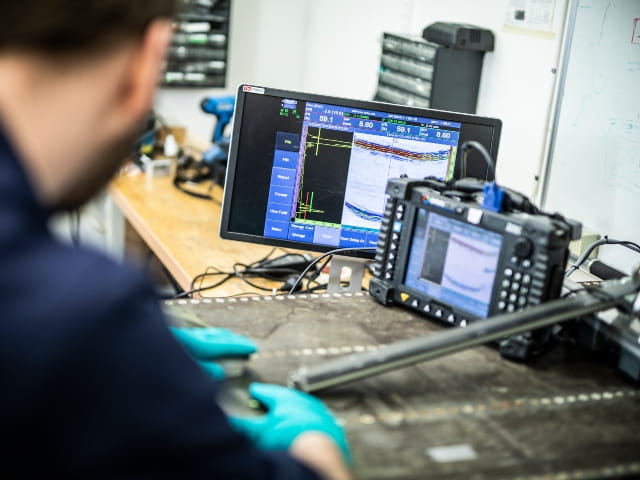文章
Qualification of the Properties of New Composite Materials
复合材料提供产品制造乐动娱乐官网商,具有与更传统材料更具潜在的优势。由两种或更多种不同的材料制成,当合并时比单独的材料强,复合材料通乐动娱乐官网常设计有特定用途。它们广泛的益处包括提高强度,重量减少,效率优异,耐用性以及更大的设计灵活性。由于它们的非导电和耐腐蚀性,它们还具有适合于严厉的苛刻,有毒环境的能力。
通常,复合材料将包括纤维材料,例如玻璃或碳与基质如聚酯,环氧或乙烯基酯组合。碳纤维增强复合材料(CFRPS)are predominantly used in more technically onerous applications and heavily regulated industries such as aerospace, while glass-reinforced polymer composites (GRPs) are more frequently used in less technical applications such as wind technology.
航空航天部门一直在使用复合材料,以便拥有扶持性能多年。Element现在越来越多地帮助客户使用复合材料作为新应用中的键启用材料。乐动娱乐官网例如,复合材料的财产极其轻量级,为低排放电动车提供了巨大的优势,而耐腐蚀性的浮力复合材料可以使用钢铁改造历史设计的石油和天然气平台。
Determining the properties of composite materials
When any new composite material is developed, it requires much more testing than a traditional material that has been in use for many years. The properties of the new composite need to be carefully determined through qualification testing in a variety of different environmental conditions involving multiple specimens.
When manufacturing a new part using a traditional material such as a metal, very little test result data is needed to prove all the required properties that design engineers require to show the part is fit for purpose. This is because the behavior of metals is very well understood over their many years of use.
While composite materials can offer significant advantages to designers and manufacturers, composites’ material properties are, unlike metals, non-isotropic, meaning the properties are not the same in all directions. They can exhibit very different responses to applied forces, which may vary significantly depending on the load and environmental conditions to which the composite material is exposed. Therefore, it is critical to have complete confidence in how the composite material will behave during its proposed use. The only way to achieve this is by testing extensively to build up the necessary bank of test data and provide all the test data required to manufacture a new part within the prescribed safety parameters.
The composite material will have to be extensively tested by the raw material manufacturer and, once it is purchased, by the product or parts manufacturer. A raw material inspection will need to take place on arrival at the manufacturing plant to ensure it has not been affected by transportation. As composites usually only have a six-month lifecycle, if the material has not been used in production within that timeframe, it will then need to be re-qualified. The certification process required before the new product or part using the composite material can be put into production will also demand extensive testing. Finally, testing for ongoing production control purposes will also be necessary.
复合材料测试
任何新的复合材料的资格处理都将包括一系列机械和物理测试方法,以评估其强度和耐用性,并确保其适合于目的。
Mechanical testing
机械测试,取决于所用测试样品的几何形状,下降三个关键类别:拉伸,压缩或剪切。
拉伸和压缩测试包括用于在纯加载模式下产生数据,开孔(缺口)测试和填充空穴测试的普通测试,这些测试用于复制寿命行为,其中材料可能需要安装紧固件或螺栓可能会影响材料的寿命。这些测试也可用于模拟材料成分中的缺陷。Flexural testscan be utilized as an alternate or supplementary testing procedure to consolidate the tensile and compressive mechanical properties further.
剪切测试包括平面内和外平面(interlaminar) shear tests。In-plane shear (IPS) tests utilize a tensile test set up to generate shear loading in fibers oriented at +/- 45° to the direction of the test. Interlaminar shear strength tests (ILSS) are used to determine the shear strength between the lamina and can also provide information on the degree of cure in relation to the fiber-matrix adhesion.
此外,元素的系列裂缝韧性试验show how the development of cracks or delamination can influence material properties. Mode I tests show the behavior of cracks opening and extending, while mode II tests are used to generate data on crack shear behavior and mode III on crack tearing or twisting. Additionally,compression after impact (CAI)tests are able to show the degradation of the materials’ mechanical properties after a controlled impact.
Element also provides an extensive range of other mechanical tests, including lap shear testing; climbing drum peel (CDP) testing; bearing testing; corner bend testing; and fastener pull-through testing to identify the weakest parts of a composite’s structure.
物理测试
Physical tests are critical to fully characterize a new composite material’s behavior and, unlike mechanical testing, are not dependent on the geometry of the material. Element offers the full range of physical testing required for material qualification and certification, including:
- Constituent content testing量化纤维和树脂的比例最高ss the new material. This can be determined, as well as the void content, using acid digestion or a burn off test, depending on the material to be tested.
- 动态机械分析(DMA)测试to determine the glass transition temperature using DMA (dynamic mechanical analysis) provides information on the safe upper working temperature of the part.
- Differential Scanning Calorimetry (DSC) testing和其他热转变以表征使用DSC的聚合物固化程度,以及其他重要的热转变,如TM(熔化温度)或TC(结晶温度),如果存在。
- 傅里叶变换红外分析(FTIR), a technique that uses infrared light to scan test samples and observe chemical properties.
- High Performance Liquid Chromatography (HPLC) testing识别,量化和分离复合材料的不同组件。
检查复合材料的微观结构
在合格新的复合零件时,分析材料的宏观和微观性能非常重要。这使得能够识别出不必要的皱纹,树脂区域,帘布层,裂缝或分层等问题。使用该技术,还可以量化孔隙率的百分比,也称为空隙含量。由于对允许样品的严格局限性是多孔的严格的限制,这是关键。显微镜也可用于进一步检查一些更复杂的机械测试故障的故障模式。
Establishing the effects of long-term physical aging
In conjunction with the physical and mechanical tests, it is also essential to fully understand the effects of long-term physical aging of the composite parts when in service. Over time the material could be exposed to a variety of environmental factors, such as continuous hot/wet conditions, which could plasticize the material and cause a decrease in the composite strength and fiber/matrix interface. Element can help accelerate this aging process in a controlled environment, and the resultant testing of the post-conditioned samples can be used to show the ‘worst case’ test results.
当该测试与原始测试的测试结合时,室温测试样品以及在亚环境温度测试的一系列样品中,可以完整地查看材料如何在所有条件下表现,确保制造商拥有一切他们需要签署零件进行服务。元素还可以帮助制造商了解接触其他调节环境的材料效果,包括清洁液,液压流体和燃料。
Taking a complete lifecycle approach to composite testing
元素为复合测试提供了一体的生命周期方法,提供了在早期设计和研发(R&D)在复合制造工艺的早期设计和开发(R&D)阶段来提供了指导,以维持质量和一致性,故障分析和最终完成。这包括导航和解释各种测试标准的细微差别复杂性所需的关键支持。
Working out of our ISO 17025 accredited state-of-the-art composite testing laboratories, Element provides the full range of mechanical and physical testing needed to prove that a part is fit for purpose. This includes capabilities to physically age specimens to compare ‘best case’ and ‘worst case’ test results and non-destructive testing (NDT) to gather information on any manufactured or accidental defects.
Our team’s wealth of experience working on R&D projects, first part qualification (FPQ) projects, raw material qualifications, and bespoke test projects ensure Element can provide expert advice on the most suitable way to perform a proposed test schedule and ensure accurate, reliable results.
Taking expert advice in the early stage of the test campaign’s definition can be hugely beneficial, saving time and money. Our composite experts work closely with the manufacturer in preparing to test, helping to clarify issues such as which test standard could best prove the properties of interest to whether all the necessary test types have been sufficiently covered in order to prove the part.
确保平滑的样品制备过程
样品制备过程的一部分,元素helps to ensure that the proposed test samples being used are of the most suitable geometry and are being taken from the most appropriate locations and directions as well as being sampled at the best frequency. Our team will also help establish the best way to machine and prepare these samples prior to the test. Element’s access to an accredited machine shop enables the extraction, machining, and preparation of test samples in line with the requirements of the relevant test standards, including the ability to apply end tabs and strain gauges if required. We also manufacture and repair composite test panels in line with the customer’s instructions.
For more information on composite qualification testing,please contact us。
Find related articles to you through the核


